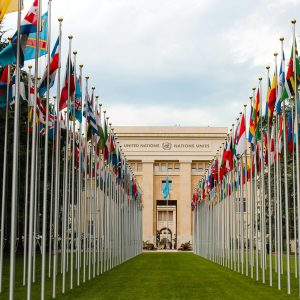ICC issues arrest warrants for Netanyahu and Gallant over Gaza war crimes
Experts say the decision marks a significant escalation in international legal efforts to hold individuals accountable for actions taken during conflicts, and its implications extend far beyond Israel and Palestine
Muslim Network TV
THE HAGUE, Netherlands (MNTV) – In a momentous and historic decision, the International Criminal Court (ICC) has issued arrest warrants for Israeli Prime Minister Benjamin Netanyahu and former Defense Minister Yoav Gallant.
The court has accused them of war crimes and crimes against humanity in connection with the ongoing war in Gaza.
These warrants highlight the gravity of the charges and the far-reaching implications for Israel’s leadership.
The three-judge panel of the ICC’s Pre-Trial Chamber I unanimously issued the warrants on Thursday, following a series of legal investigations led by the court’s prosecutor, Karim Khan.
The charges against Netanyahu and Gallant are tied to military actions taken in Gaza, which has been ongoing since October 2023.
Specifically, the charges include the use of starvation as a method of warfare, alongside allegations of murder, persecution, and the denial of essential supplies to Gaza’s civilian population.
The court’s ruling asserts that Netanyahu and Gallant are responsible for intentionally depriving the people of Gaza of critical necessities, including food, water, medicine, medical supplies, and fuel, during the course of the conflict.
These actions are alleged to have directly contributed to the worsening humanitarian crisis, leading to preventable deaths from malnutrition, dehydration, and inadequate medical care, including surgeries performed without anesthesia due to the disruption of medical supply lines.
This conduct, according to the ICC, constitutes violations of international humanitarian law and is classified as crimes against humanity.
Legal and diplomatic ramifications
Experts say the decision marks a significant escalation in international legal efforts to hold individuals accountable for actions taken during conflicts, and its implications extend far beyond Israel and Palestine.
The arrest warrants against Netanyahu and Gallant now place them in a unique and precarious position: any travel to the 120 countries that are signatories to the Rome Statute—the founding treaty of the ICC—could result in their immediate arrest and transfer to The Hague for trial.
While Israel is not a member of the ICC and has not ratified the Rome Statute, the court’s ruling nonetheless signifies an attempt by the international community to apply pressure on Israel over its actions in Gaza.
Although Israel has officially rejected the ICC’s jurisdiction, arguing that it is an independent nation with a robust legal system, the decision to issue warrants for its leaders demonstrates the court’s stance on holding individuals accountable for violations of international law, regardless of their nationality.
In practice, the arrest warrants may have limited immediate impact, given that Israel’s key allies, notably the United States, are not part of the ICC.
Israel has made clear that it will not comply with the warrants, and since the court does not have its own police force, enforcement largely depends on cooperation from ICC member states.
However, the arrest warrants have significant symbolic value.
They amplify international criticism of Israel’s military conduct and raise questions about the legitimacy of its actions in Gaza, potentially making it more difficult for Netanyahu and other Israeli officials to travel freely, particularly to European and other ICC member states.
The arrest warrants may also complicate efforts by Israel and other countries to negotiate a ceasefire or peace agreement, as they further isolate Israeli leadership on the global stage.
The ICC’s decision also signals growing international pressure for accountability and the need for a cease-fire.
The arrest warrants also highlight the need for greater scrutiny of actions taken during wartime, particularly when civilians bear the brunt of the violence.
The decision may also lead to increased diplomatic isolation for Netanyahu and his government. Already, Israel faces mounting calls from the international community to cease its military operations in Gaza and to take more decisive steps toward peace.
In addition to the arrest warrants for Netanyahu and Gallant, the ICC has also issued a warrant for Mohammed Deif, the leader of Hamas’ military wing, in connection with the October 7, 2023, operation.
These attacks, which killed over 1,000 Israelis.
However, while Israel has reported Deif’s death in airstrikes, his fate remains uncertain, and the ICC continues to investigate whether he is still alive.
The court had previously sought arrest warrants for senior Hamas leaders Ismail Haniyeh and Yahya Sinwar, but these were withdrawn after both men were reported killed in the ongoing conflict.
The Israeli government has condemned the warrants as an unfair and politically motivated attack on the legitimacy of its military actions.
Officials argue that the ICC’s decision undermines Israel’s legal right to defend itself against terrorism, especially in light of Hamas’ continued attacks on civilians and its role in initiating the conflict.
Israel’s Foreign Ministry has stressed that the country has a robust and independent judicial system capable of investigating allegations of wrongdoing.
However, rights groups have criticized Israel for its failure to adequately investigate accusations of war crimes in the past, and the ICC’s intervention has been seen by many as an attempt to address this accountability gap.
Despite the potential for limited immediate consequences, the ICC’s decision signals a growing recognition of the need for international oversight in conflicts, especially when grave violations of human rights occur.
The arrest warrants may further shift global perceptions of Israel’s actions in Gaza, heightening calls for a ceasefire and the protection of Palestinian civilians, while also elevating the stakes in the ongoing diplomatic and legal battles over the conflict.
ICC background
The ICC is an intergovernmental organization and international tribunal seated in The Hague, Netherlands. It is the first and only permanent international court with jurisdiction to prosecute individuals for the international crimes of genocide, crimes against humanity, war crimes and the crime of aggression.
The ICC is distinct from the International Court of Justice, an organ of the United Nations that hears disputes between states.
Established in 2002 pursuant to the multilateral Rome Statute, the ICC has four principal organs: the Presidency, the Judicial Divisions, the Office of the Prosecutor and the Registry.
Dozens of individuals have been indicted in the ICC, including Ugandan rebel leader Joseph Kony, former President Omar al-Bashir of Sudan, President Uhuru Kenyatta of Kenya, Libyan head of state Muammar Gaddafi, President Laurent Gbagbo of Ivory Coast and former Vice President Jean-Pierre Bemba of the Democratic Republic of the Congo.
On March 17, 2023, ICC judges issued arrest warrants for Russian leader Vladimir Putin and the Presidential Commissioner for Children’s Rights in Russia Maria Lvova-Belova for child abductions in the 2022 Russian invasion of Ukraine.









